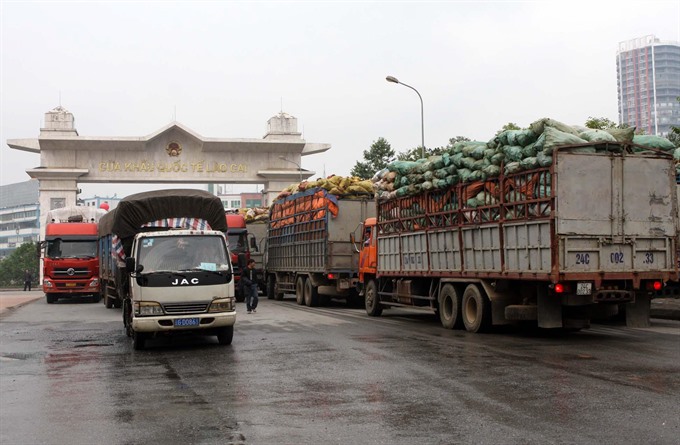 Economy
Economy

In a newly issued decree, the Government has made an effort to boost border trade quotas and the overall trade situation for Vietnamese residents in the border area between Việt Nam, China, Laos and Cambodia.
 |
| Shipments of agricultural products leave Việt Nam via the Lào Cai International Border Checkpoint. — VNA/VNS Photo Trần Việt |
HÀ NỘI — In a newly issued decree, the Government has made a clear effort to boost inland border-trade quotas and the overall trading situation for Vietnamese residents living in the border areas next to Việt Nam, China, Laos and Cambodia.
Data from the General Department of Việt Nam Customs states that in 2017, Việt Nam’s trade turnover with Laos was above US$890 million, while the turnover with Cambodia was $3.7 billion, and with China, a staggering $71.9 billion.
With the Decree No 14 coming into effect on January 23, trading activities performed by border residents and licensed traders are expected to be significantly improved.
Most importantly, the decree stipulates that goods traded and exchanged by border residents for direct consumption are not subject to medical quarantine, such as animals, plants and aquatic products, unless the competent State body warns of an epidemic or contagious disease.
Therefore, goods consumed by border residents are not subject to inspection and control in terms of food quality and safety, except for emergencies requiring immediate quarantine, when they must comply with international treaties.
The decree stipulates that Vietnamese traders, including enterprises, co-operatives, business households and individuals with Vietnamese business registrations are allowed to buy, sell and trade goods along the border and via border checkpoints.
Businesses with foreign-direct-investment capital, companies and branches of foreign companies in Việt Nam are also allowed to purchase and exchange goods across the border in accordance with national Law on Foreign Investment Management and any international treaties to which Việt Nam is a member.
Border residents, defined as Vietnamese citizens with permanent residence in border areas, are now exempt from customs duties on goods valued at not more than VNĐ2 million (US$89) per person per day, and on no more than four days a month.
The value of duty-free quotas in excess of the above limits is subject to import tax and other taxes and charges (if any) in accordance with Vietnamese law.
In addition, Decree 14 also contains new administrative reforms, including the abolition of the Border Trade Steering Committee.
Traders engaged in the purchase, sale or exchange of goods across borders shall have to fully pay taxes, charges and fees according to the provisions of law.
The decree also states that goods traded or exchanged across borders are entitled to preferential value-added tax refunds, according to the provisions of law.
Vũ Bá Phú, director of the Việt Nam Trade Promotion Agency and head of the 2017 National Trade Promotion Programme, said at a conference early this week that the Ministry of Industry and Trade considered goods produced by border residents and bordering countries (Laos, Cambodia and China) as serving multilateral trade ties.
Vietnamese trade associations and trade promotion organisations encourage border traders to access and expand markets in bordering countries, said Phú.
He said he hoped that by bringing domestically produced goods to rural, mountainous and border areas, the ministry could boost trade and create distribution channels for essential products.
In 2017, the ministry co-ordinated with other ministries and localities to organise trade-promotion programmes in border and mountain areas, including the Việt Nam-China International Trade Fair.
Late last year, the World Bank published its global Doing Business 2018 report. Accordingly, Việt Nam’s time and cost of cross-border trade were classed as having changed positively.
As a result, the country now ranks fourth in South-east Asia behind Singapore, Thailand, and Malaysia in terms of cross-border trading. — VNS